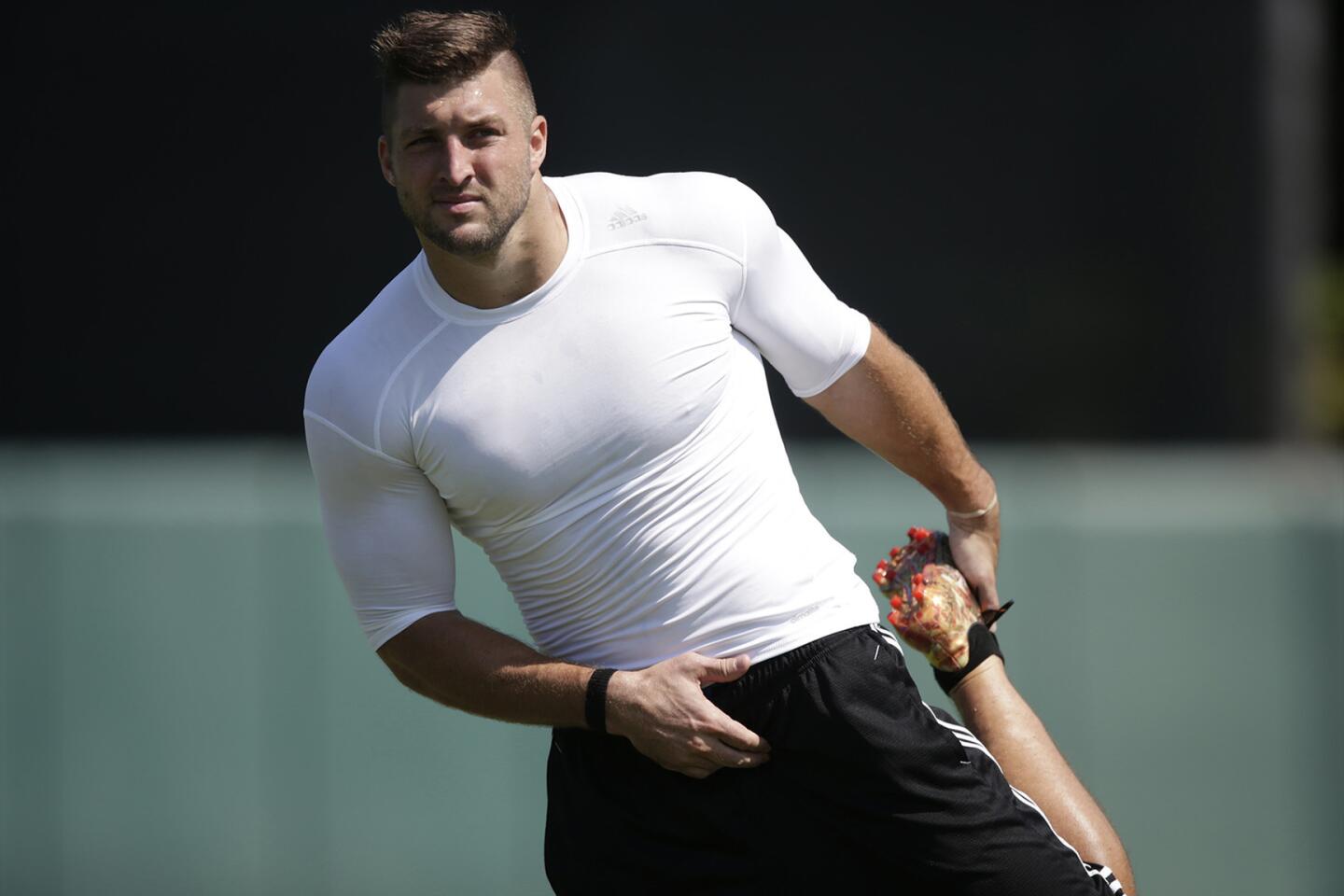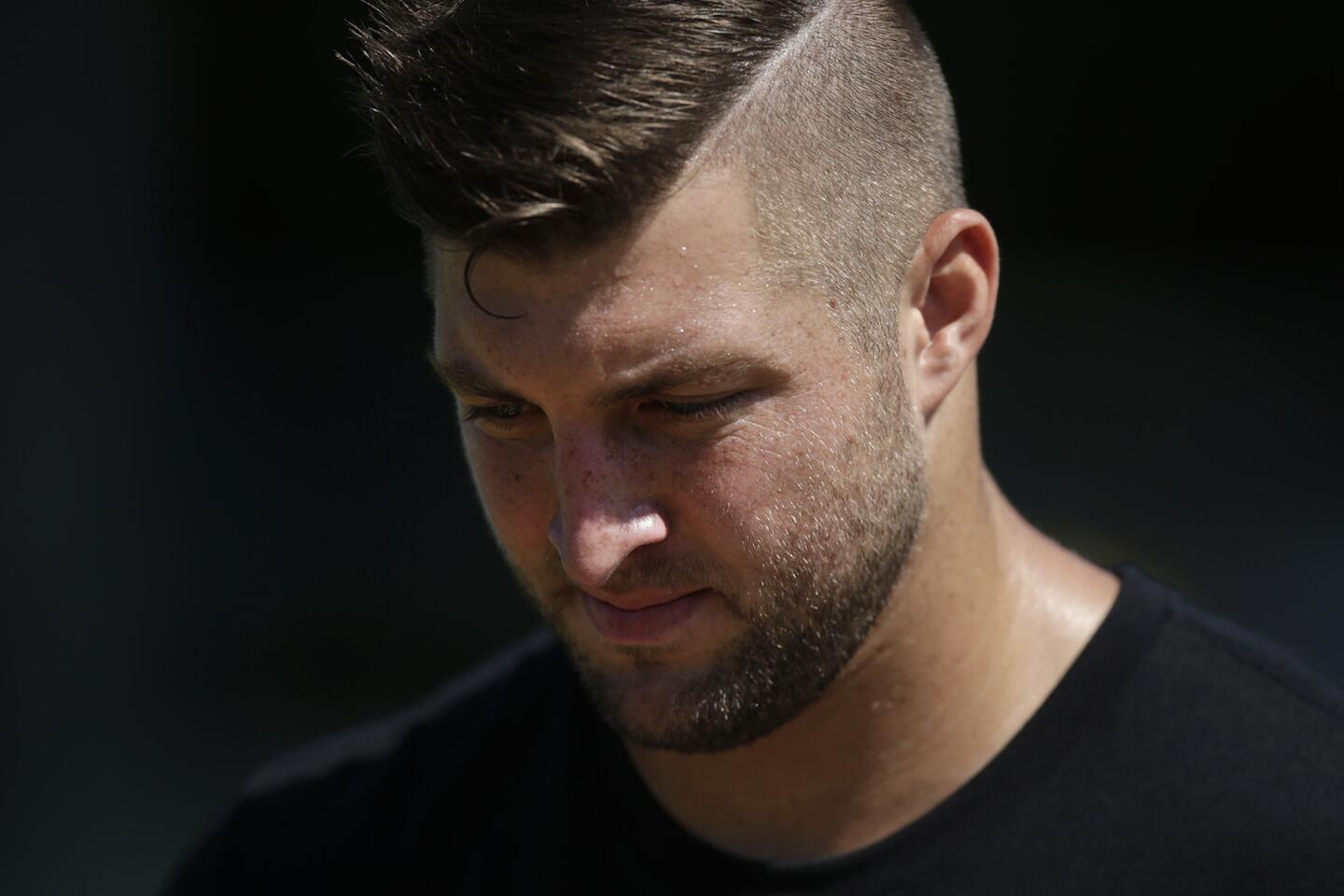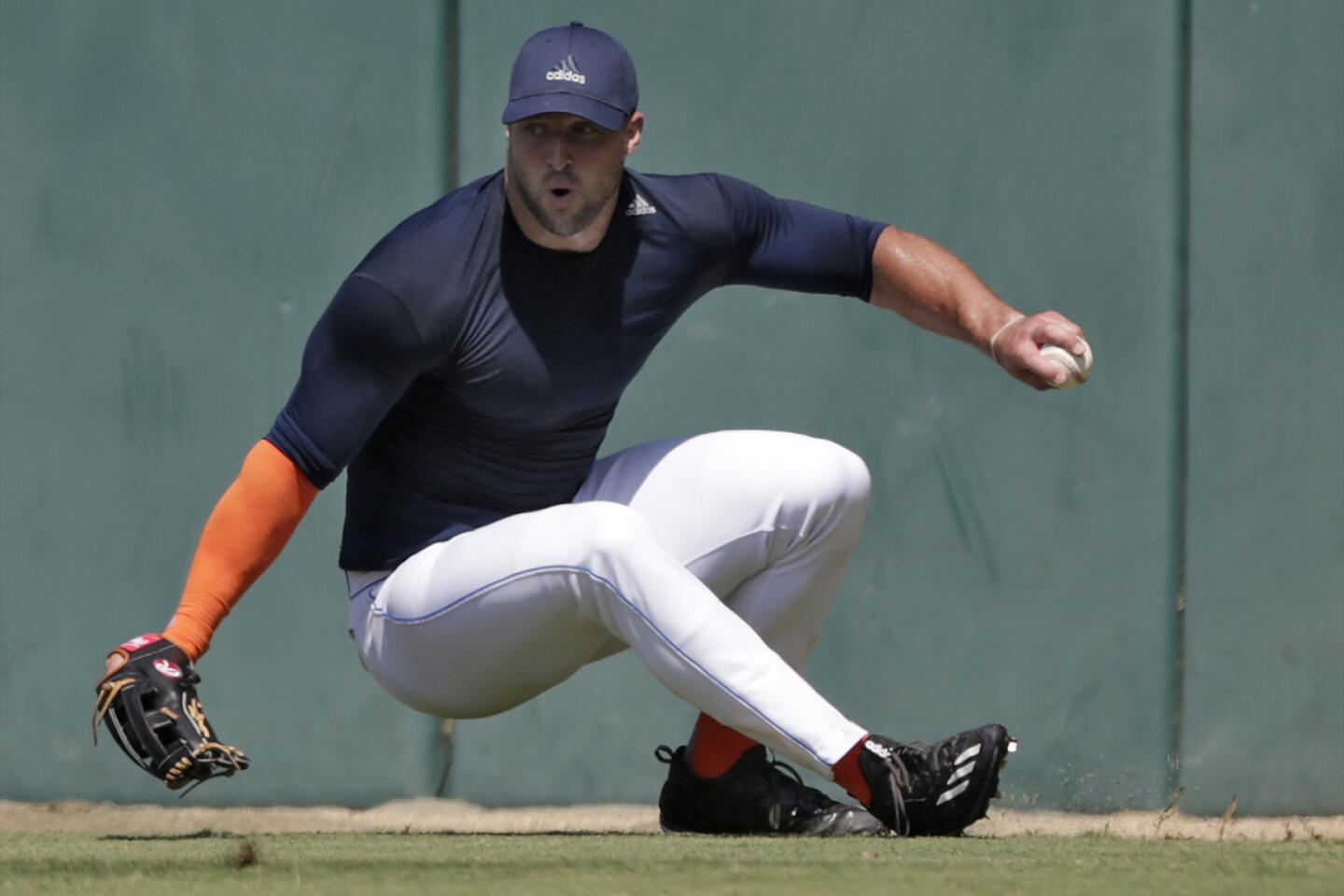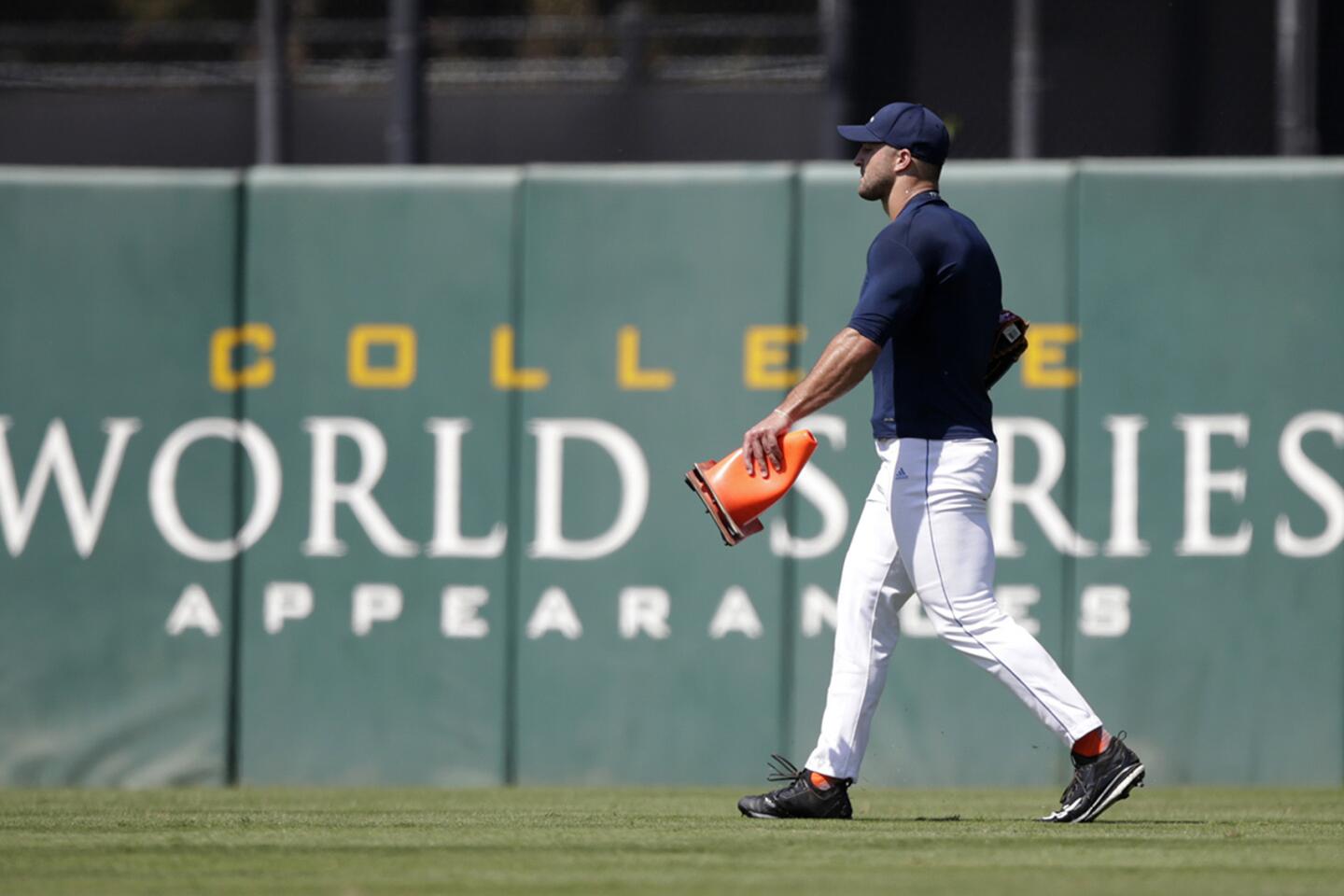Column: It’s a story because, well, it’s Tim Tebow working out
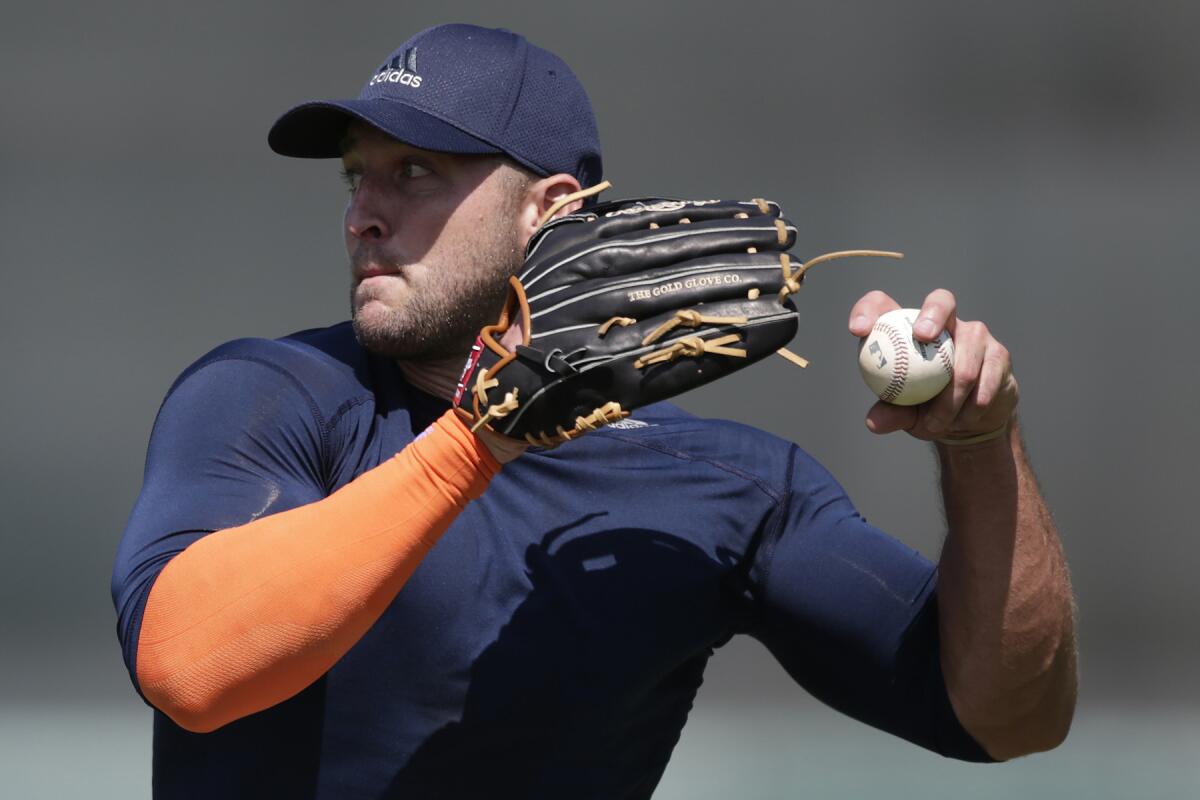
- Share via
Around the corner from the baseball stadium on USC’s campus Tuesday morning, I ran into an old friend. The instant we made eye contact, we started to laugh.
What else were we supposed to do? Complain that our newspapers had sent us there to cover something that didn’t feel like news?
Except this was news. Big news, actually.
Tim Tebow was about to work out in front of baseball scouts.
Sorry, but why was this important?
Tebow is 29. He started training in May with former major league catcher Chad Moeller. The last time he played organized baseball was more than a decade ago, when he was a high school junior. In other words, he has virtually no chance of ever playing in the major leagues.
And it’s not as if he retired as the best player in another sport to pursue baseball, as was the case with Michael Jordan.
If there was ever a media-driven story, this was it. Tebow became a story because we said he was.
He is part of a group of bizarre modern celebrity athletes that includes devil child Yasiel Puig and train wreck Johnny Manziel, for whom on-the-field performance is secondary to the ideas they represent.
In the case of Tebow, fans either loved or hated his in-your-face evangelism and overly earnest demeanor, which made him one of the most divisive athletes of the last decade. Tebow guaranteed ratings and page views.
The problem now is that Dr. Frankenstein has lost control of the monster he created. The demand for Tebow is never-ending. Or at least we think it is.
So there I was, along with 40 or 50 other journalists. The amount of attention directed at this glorified workout made it necessary for major league teams to be there, too, which is why there were also 46 scouts from 28 organizations. The Dodgers sent their scouting director, Billy Gasparino.
One American League scout said he thought most teams sent a representative to the showcase as a sign of good faith toward powerful Creative Artists Agency, which represents Tebow. That scout didn’t sound particularly enthusiastic about being there, recalling that when his scouting director asked him if he wanted to watch Tebow, he responded by asking, “What’s my bonus?”
First up was the 60-yard dash, with Tebow sprinting from one set of cones in the outfield to the other. A couple of scouts clocked him at 6.76 seconds.
Though a National League scout called Tebow’s time “average,” he was taken by his chiseled physique. On a fact sheet distributed by CAA, Tebow was listed at 6 feet 3 and 255 pounds, with 7.3% body fat.
“If I had that body,” he said, “I wouldn’t own any shirts.”
Tebow then went to the outfield and threw to bases.
“The arm action is not great,” said the same scout, who spoke under the condition of anonymity because his organization forbids him to share his observations.
I assumed he knew what he was talking about, considering that in an earlier conversation, he made the astute observation that Dodgers fans are “unsophisticated” and “simple-minded.”
“Angels fans are awful too,” he said.
Tebow moved to center field to run down balls hit off a fungo. When he was finished, he picked up the cones that were used earlier for the 60-yard sprint rather than have an assistant do it.
That shows something, no?
“I think that’s why he did it,” one scout said.
“Work ethic,” another added sarcastically.
The last phase of the showcase consisted of batting practice. In regular batting practice, the left-handed-hitting Tebow showed some legitimate power, clearing the scoreboard in right-center field.
If that exercise displayed his virtues, the live batting practice session that followed exposed how far he is from playing in the major leagues.
Tebow was carved up by former major league reliever Chad Smith, who posted an 8.32 earned-run average in 12 career games. He didn’t fare any better against David Aardsma.
Nonetheless, several scouts still figured Tebow would find a taker, if only because his presence could positively influence an organization’s prospects.
You could understand why if you heard Tebow speak. He talked about how he was taking this seriously, how this wasn’t a publicity stunt. He spoke enthusiastically of his love for baseball, how quitting the sport to enroll early at the University of Florida was one of the toughest decisions of his life.
“This is something I love and I’m passionate about it, but it’s not my identity,” he said. “It’s not my foundation. I have that in so many bigger things in faith, family and all my relationships. I think when you have that mind-set, it lets you be free to go out and compete, it lets you be free to do something a lot of people think you can’t do, to go after what you believe in rather than you having the fear of failure or the fear of what other people say about you.”
He showed a sense of humor too. When I asked him what he thought of Colin Kaepernick’s refusal to stand for the national anthem, he smiled, looked at another reporter and playfully said, “What’s your question?”
The audience laughed. Tebow had a similar response when I asked if he thought he could help Puig become a better person.
I didn’t think it was a bad idea. What if the Dodgers sign Tebow, hold on to Puig and send them both to the same minor league affiliate with a documentary crew?
Who knows? Maybe the addition of “The Tebow & Puig Show” to the SportsNet LA lineup would convince DirecTV to finally pick up the channel.
Silly, I know. But then again, everything about this was.
dylan.hernandez@latimes.com
Twitter: @dylanohernandez
More to Read
Go beyond the scoreboard
Get the latest on L.A.'s teams in the daily Sports Report newsletter.
You may occasionally receive promotional content from the Los Angeles Times.
